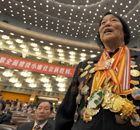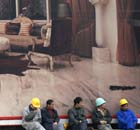Middle East
Iraq's election front-runner urges caretaker government
(Xinhua)
Updated: 2010-04-29 01:31
 |
Large Medium Small |
The front-runner in Iraq's March 7 parliamentary elections said on Wednesday it rejects any change to the poll results and threatened to resort to the international community to help create a caretaker government to hold new polls.
The Iraqia List, headed by former Prime Minister Ayad Allawi, made the call after a meeting of its leading politicians Tuesday evening to discuss a recent decision by an electoral judicial panel to invalidate the votes of 52 candidates, including six winners, it said in a statement.
Tariq Harb, a lawyer close to Prime Minister Nuri al-Maliki's State of Law bloc, told reporters Tuesday that two of the disqualified candidates are from Allawi's Sunni-backed bloc.
The Iraqia List narrowly won the most votes in the March 7 elections, defeating a bloc led by al-Maliki by 91 seats to 89, according to the vote results.
But coalition talks with smaller parties appear to have stalled as any party needs 163 seats to form a majority government.
The statement said that the Iraqia List will send a letter to the head of the Supreme Judicial Council, "stressing the urgency of his intervention to protect the judiciary from political influence, as this may have serious ramifications on the stability of the country."
The statement held Maliki's government and the Accountability and Justice Commission in charge of vetting candidates for ties to Saddam Hussein's Baath party, responsible for changing the elections results through "malicious disqualifications and arrests affecting the candidates and supporters of Iraqia bloc."
It also said that the Iraqia List has "examined the option of resorting to the international community," including the UN Security Council, the European Union, Organization of the Islamic Conference and the Arab League to protect the political process " from any injustice, and to form a caretaker government and repeat the elections in an environment free of any political manipulation. "
The Iraqia List justified its latest threats as Iraq is still governed under Chapter VII of the UN charter which gives the UN security council the power to maintain peace in the country.
Iraq was put under Chapter VII since 1990 when former president Saddam Hussein invaded Kuwait.
Before the elections, the Iraqi Independent High Electoral Commission banned more than 500 politicians, mostly Sunnis, from running in the national vote over alleged links to Baath party.
The blacklist pushed by the Shiite-dominated Accountability and Justice Commission arouses concerns about a possible spark of sectarian violence, as the move was widely believed to be an attempt by the Shiite parties which currently prevail the political scene to reduce the gains of other Iraqi factions in the March 7 elections.






